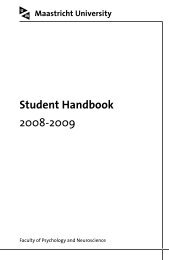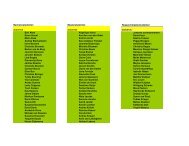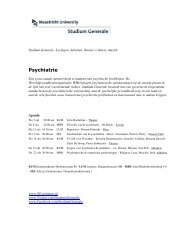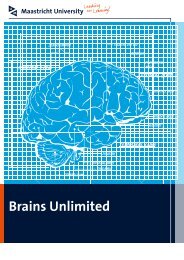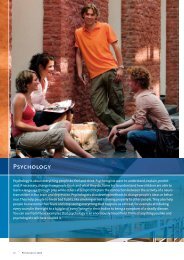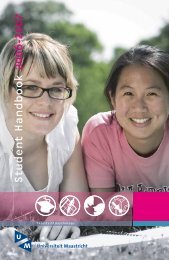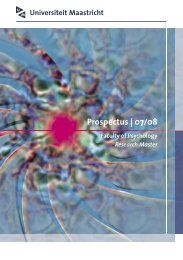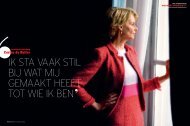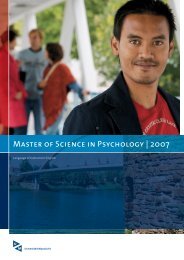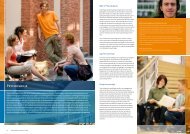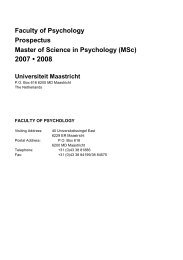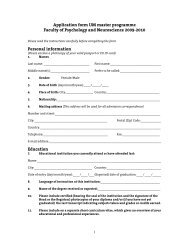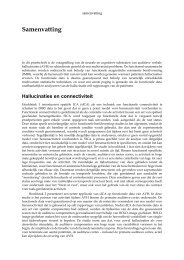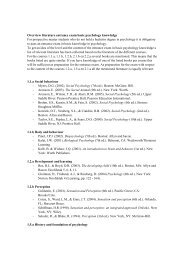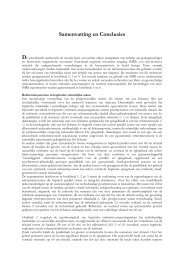Prospectus | 08/09 - Psychology and Neuroscience - Maastricht ...
Prospectus | 08/09 - Psychology and Neuroscience - Maastricht ...
Prospectus | 08/09 - Psychology and Neuroscience - Maastricht ...
Create successful ePaper yourself
Turn your PDF publications into a flip-book with our unique Google optimized e-Paper software.
<strong>Prospectus</strong> Research Master <strong>Psychology</strong> 20<strong>08</strong> • 20<strong>09</strong><br />
142<br />
a. With respect to the writing of papers:<br />
• literal or paraphrased copying of passages from other papers or oral texts, from<br />
scientific articles or books, from sources on the Internet or from other electronic<br />
papers in such a way that the impression is given that it is one’s own work;<br />
• literal copying or copying with minimal changes of extensive passages (more than<br />
a couple of sentences) from above mentioned sources with or without reference to<br />
the source text in such a way that the impression is given that it is one’s own work.<br />
b. With respect to taking tests, comparable proofs of ability, <strong>and</strong> examinations:<br />
• disposing over the usage of texts other than those of which the use is expressly<br />
permitted, on or in the vicinity of the table where the examinee sits or another<br />
place accessible to the examinee, during the taking of the test;<br />
• exchanging information with a co-examinee, where <strong>and</strong> in whatever way, during<br />
the taking of the test.<br />
Article 4<br />
If in the opinion of the examiner a (possible) case of fraud has taken place, the examiner<br />
as a rule takes the following action:<br />
a. If the (possible) fraud has been ascertained during the taking of the test:<br />
• the examiner notifies the examinee of the ascertained (possible) fraud;<br />
• any text that the examinee may have unjustly had at his/her disposal for usage is<br />
confiscated;<br />
• the examinee is given the opportunity to complete the test, unless the examiner<br />
decides otherwise;<br />
• the examiner will bar the student from further participation in the test, if the<br />
examinee refuses to h<strong>and</strong> over the text that was possibly unjustly kept at h<strong>and</strong> in<br />
order to be used;<br />
• a text that has been confiscated is normally not returned to the examinee after<br />
the test is finished, unless the examiner decides otherwise;<br />
• the examiner documents the relevant facts connected with the suspected fraud<br />
in writing <strong>and</strong> sends this statement without delay to the Board of Examiners,<br />
together with any texts that had been confiscated.<br />
b. if the (possible) fraud has been ascertained during or after the correction of a test or<br />
examination:<br />
• the examiner notifies the Board of Examiners in writing without delay about the<br />
(possible) fraud, providing the relevant papers <strong>and</strong> documents;<br />
• the Board of Examiners notifies the examinee about the ascertained (possible)<br />
fraud.<br />
c. if the (possible) fraud is ascertained during or after the correction of written papers<br />
that are part of a test or that count as part of the course assessment:<br />
• the examiner notifies the Board of Examiners in writing without delay of the<br />
(possible) fraud, adding the relevant papers <strong>and</strong> documents;<br />
• the Board of Examiners notifies the examinee about the ascertained (possible)<br />
fraud.<br />
Article 5<br />
The Board of Examiners deals with cases of possible fraud in the following manner:



